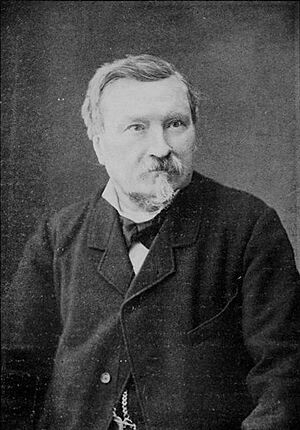Gustave de Molinari facts for kids
Quick facts for kids
Gustave de Molinari
|
|
|---|---|

Gustave de Molinari, c. 1849 or 1860s
|
|
| Born | 3 March 1819 |
| Died | 28 January 1912 (aged 92) Adinkerke, Belgium
|
| Nationality | Belgian |
| School or tradition |
French Liberal School |
| Influences | Frédéric Bastiat · Hippolyte Castille |
| Contributions | Private defence agency |
Gustave de Molinari (born March 3, 1819 – died January 28, 1912) was an important thinker from Belgium. He was a political economist, which means he studied how countries manage their money and resources. He was part of a group called the French Liberal School. These thinkers believed strongly in laissez-faire, a French term meaning "let do." It suggests that governments should interfere as little as possible in the economy. Molinari was influenced by other famous economists like Frédéric Bastiat.
About Gustave de Molinari
Gustave de Molinari was born in Liège, a city in what is now Belgium. He often had strong opinions about how governments should work. He believed that governments, or "the state," sometimes had too much power and gave special treatment, or privilege, to certain groups.
For example, Molinari had a unique view on the American Civil War. He thought the war was more about trade interests for businesses in the North. He believed it was less about ending slavery, even though he knew that abolitionism was part of the reason for the war.
Molinari wrote about this in his last work, published just a year before he passed away in 1912. He felt the war "ruined the conquered provinces." He also believed that powerful people in the North achieved their goal. This goal was to create a system of high taxes on imported goods. He thought this led to big companies called "trusts" and created many billionaires.
Molinari's Ideas on Society
Molinari supported his ideas about freedom and limited government by using concepts from evolution. He thought that society was moving towards an "economic state." This would be an international system where businesses could operate freely. He believed this was the final stage of how societies develop.
He argued that this development was caused by a "struggle for existence" between different businesses. In the past, he felt that wars helped societies grow and encouraged new inventions. However, once industries became more developed, wars became harmful. They were replaced by economic competition.
Molinari believed this competition was better because it applied to everyone. He thought that if less successful businesses were naturally removed by competition, society as a whole would improve over time. He also believed this kind of competition would never end.
Because of these beliefs, Molinari was against both monarchy (rule by a king or queen) and socialism (where the government controls many parts of the economy). He thought these systems would stop the natural progress of society. He also knew that great poverty had grown alongside great wealth. But he argued that poverty would disappear as people became more moral and as the economy continued to grow.
Molinari's Influence
Some people who support a political idea called anarcho-capitalism see Molinari as the first person to suggest it. Anarcho-capitalism is a way of thinking about how society could work without a traditional government.
Murray Rothbard, an important economist, wrote about Molinari's 1849 article, The Production of Security. Rothbard called it the "first presentation anywhere in human history of what is now called anarcho-capitalism." However, he also said that Molinari did not use that exact term.
Another economist, Hans-Hermann Hoppe, said that Molinari's 1849 article is "probably the single most important contribution to the modern theory of anarcho-capitalism." In the past, Molinari also influenced the ideas of Benjamin Tucker, who was an individualist anarchist.
Today, an organization called the Molinari Institute is named after him. This institute studies ideas about how markets could work without government control.
See also
 In Spanish: Gustave de Molinari para niños
In Spanish: Gustave de Molinari para niños
 | Kyle Baker |
 | Joseph Yoakum |
 | Laura Wheeler Waring |
 | Henry Ossawa Tanner |

